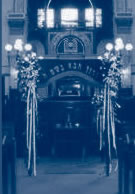|
SEDRA : BO: Hertz Chumash p. 248 Exodus
Chap. 10 v. 1
This week's Sedra is generously sponsored by Mark Fagenblat.
SYNOPSIS:
After Moses warned Pharaoh that on the following day a plague
of locusts would destroy Egypt's crops, Pharaoh's courtiers
urged him to let the Israelite men depart. However, Moses
and Aaron insisted that the women, children and flocks of
the Israelites also be allowed to leave. As a result, they
were driven from Pharaoh's presence.
The next day Moses extended his rod, and an east wind carried
a swarm of locusts into Egypt which devoured the country's
vegetation. After witnessing this disaster, Pharaoh admitted
his error and begged Moses and Aaron to pray for the removal
of the plague. They complied and a strong west wind drove
the locusts into the Red Sea. However, once again Pharaoh
reverted to his stubbornly negative attitude.
Moses then brought the next plague upon the Egyptians, a
total darkness, which descended upon Egypt. For 3 days the
Egyptians were unable to move about, but the Israelites were
granted light within their dwellings. The resulting nightmarish
chaos proved too much for Pharaoh and he now offered to allow
all Israelites - men, women, and children to leave, provided
their flocks and herds were left behind as surety that they
would return. Moses rejected this stipulation and Pharaoh
forbade him to appear again in the royal presence. Moses replied
that there would be one final, devastating plague; one that
would cost all Egyptian firstborn their lives.
Moses and Aaron then departed from before Pharaoh for the
last time. G-d informed Moses that the redemption was imminent
and that henceforth the Calendar would begin with the month
of their deliverance (Nissan). On the tenth of this month,
each head of a household was to set aside an unblemished male
lamb to be kept until the evening of the fourteenth day, when
it was to be sacrificed. Some of its blood was then to be
smeared on the lintel and doorposts of the house as a sign
that the inhabitants were Israelites. That night the meat
of the lamb was to be eaten when roasted together with unleavened
bread and bitter herbs. Any of it remaining in the morning
was to be burnt. Furthermore, it was to be consumed in haste
and the participants were to be prepared to start on a journey.
On that night G-d would smite all the Egyptian firstborn but
would spare those whose houses were daubed with the lamb's
blood. In the future, this festival was to be observed annually
as Pesach, a permanent reminder of the deliverance from Egypt.
Only unleavened bread was to be eaten for seven days and all
leaven was to be removed. The first and seventh days of the
festival were to be observed as days of holy assembly when
all work would be forbidden. The sacrifice of the Pesach offering
was to be observed in the land of Israel after the conquest,
and its significance was to be explained to all future generations.
Precisely at midnight G-d smote all the Egyptian firstborn,
both man and animal. Pharaoh and his fellow Egyptians rose
in the middle of the night to bitterly lament their loss.
They then implored the Israelites to leave, as G-d had predicted,
speaking not from a position of power, but from one of utter
subjugation.
The Israelites left in such haste that their leavened dough
had no time to rise. (Therefore, Jews have eaten unleavened
bread, or Matzah on Pesach ever since.) There were six hundred
thousand men aged between 20 and 60 who began the journey
and they brought with them their wives and children as well
as a large number of other persons - "a mixed multitude".
They also carried a large supply of gold, silver and utensils,
which the Egyptians had given them. The Jews were commanded
to bring a Korban Pesach every year on the fourteenth day
of Nissan. They were to redeem their firstborn male children
in all future generations, and to wear Tefillin "for
a sign on your hand and for a memorial between your eyes"
to remind them of the salvation from Egypt.
HAPHTORAH : HERTZ CHUMASH P. 263 Jeremiah Chapter 46
The prophet foretells the destruction of Egypt, thus presenting
a similar theme to that in the Sedra.
TELL ME RABBI ... TEFILLIN
The tefillin (translated as Phylacteries) consist of two
small black leather boxes, containing small scrolls of parchment
upon which are written four Biblical passages.
They are Exodus 13: 1-10 ("Consecrate every first born
to Me ..."); Exodus 13:11-16 ("When the Lord will
bring you into the land..."); Deut. 6:4-9 ("Hear
O Israel, the Lord is our G-d, the Lord is One...");
and Deut. 11:13-21 ("If you will diligently obey my commandments
...").
The two passages from Exodus derive from today's Torah Reading
- Bo. The other two are from the Shma. These four passages
from the Torah all include the commandment to don tefillin
as a sign and symbol of Jewish faith and devotion. The word
"tefillin" reminds one of the Hebrew word "tefillah",
which means prayer.
Both words are derived from the same root meaning "judgment".
Prayer and the ritual objects associated with it testify to
our faith in the presence and judgement of the Almighty, while
also providing the opportunity for self-examination and self-judgment.
Each Tefillah (black box) comes with leather straps (Hebrew:
retzuot) so designed as to enable one to be bound upon the
hand and for the other to be worn above the forehead. The
leather straps, the boxes and the parchment are all made from
the hide of kosher animals. The writing must be handwritten
by a scribe on parchment made from the skin of kosher animals.
Putting on tefillin has become the most visible religious
ritual that "sets the men apart from the boys."
It is the religious symbol and ritual obligation that is most
closely identified with becoming Bar Mitzvah. This mitzvah
is observed only during the day, preferably in the morning
in conjunction with the recitation of the shacharit, morning
prayers.
Tefillin are not worn on Sabbaths or Festivals.
Tefillin serve as a symbol, a reminder to the Jew of all the
commandments at a time when he is occupied and burdened by
multiple concerns and may possibly forget. For such times,
it is also considered an adornment. But the Sabbath and the
Festivals are in themselves a symbol - reminders of the Covenant
between G-d and Israel.
The very Sabbath day itself and the very Festival itself is
intended to serve as an ever present reminder of G-d's Presence
and of His commandments. The Sabbath and Festival days are
themselves also special adornments to the life of the Jew.
To add the observance of tefillin in the context of its meaning
and purpose would not only be superfluous but would imply
downgrading the Sabbath or Festival. Strange as it may sound,
the sacred tefillin may not even be handled on the Sabbaths
and Festivals.
"Shabbat Shalom" is generously sponsored by Rosetta
and Nathan Baron
BACK TO SHABBAT SHALOM
TABLE
|








